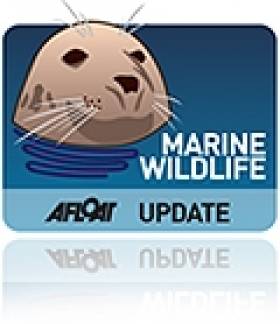Displaying items by tag: Tom McCarthy
Baltimore Whale Carcass Creating 'Rancid Oil Slick' in Conservation Area
#BALTIMORE WHALE - Nine weeks after the tragic demise of the Baltimore Harbour fin whale, its carcass is still afloat off West Cork, creating a “rancid oil slick” in a special conservation area, according to a local resident.
Tom McCarthy contacted Afloat.ie with the above image of the 65ft whale carcass, which was towed out to the grey seal breeding ground off the Carthys Islands in Roaringwater Bay and has apparently been left to rot.
“It has been left here since the middle of August to decay,” says Tom. “The rancid oil slick is clearly visible and extends for over 1km on relatively still days, the smell is horrendous."
As previously reported on Afloat.ie, plans were afoot to sink the fin whale carcass that was trapped in Baltimore Harbour in mid-August and endured a harrowing few days trapped in Baltimore Harbour before it died from what's presumed to be a combination of illness and injury.
Tom McCarthy claims that the National Parks and Wildlife Service (NPWS) has washed its hands of the situation, considering the enormous marine mammal carcass to be a natural occurrence "even though the animal beached and died several miles [away and] was wrapped in a net and towed to its final resting position".
The location is in a Special Area of Conservation - yet according to Tom, no risk assessment appears to have been carried out beforehand.
"Ten minutes on the internet would show that whales are perhaps the most contaminated animals in the world," he says. "Their blubber is contaminated with persistent organic compounds such as PCBs, DDT, dioxins, etc and the internal organs such as the liver and kidneys are 'high', 'very high' or 'staggeringly high' in mercury, cadmium, chromium, etc.
"Some beached whales are found to be so contaminated the whale itself has to be considered as hazardous waste and disposed of as such."
Tom notes that the area is fished extensively for shrimp, crab, lobster and pollock, and that the rotting carcass is in close proximity to several mussel farms.
"It seems inevitable that as the whale continues to decay and is eaten whatever contaminants were present prior to death will re-enter the food chain."
He compares the current situation to a similar whale carcass disposal in Sligo last year, where the flesh was cut off and sent for incineration while the bones were marked for later skeletal recreation and sent for composting.
Regarding the West Cork whale carcass, Tom says: "Some estimates say it will take three years for the whale to completely decay."
Tom adds that he has been in contact with Cork County Council and hopes to hear on Monday about plans for a more appropriate method of disposal for the whale carcass.
























































